Fleurs du Mal Magazine


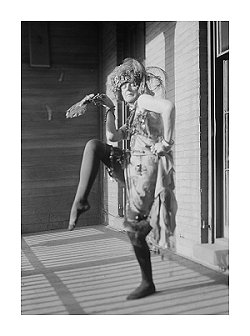
Elsa von Freytag-Loringhoven
(1874 – 1927)
CAFÉ DU DÔME
FOR THE LOVE OF MIKE !
LOOK AT THAT –
MARCELLED –
BE – WHISKERED –
BE – SPATTED –
PATHETIC –
LYMPHATIC –
ESTHETIC-
PIGPINK –
QUAINT –
NATTY –
SAINT KYK!
GARCON?? !
UN PNEUMATIC CROSS – AVEC SUCTIONDISC’S
TOPPED AVEC RUBBER THISTLE WREATH –
S’IL VOUS PLAIT.
E.V.F.L
Elsa von Freytag-Loringhoven poetry
fleursdumal.nl magazine
More in: Archive E-F, Dada, Freytag-Loringhoven, Elsa von
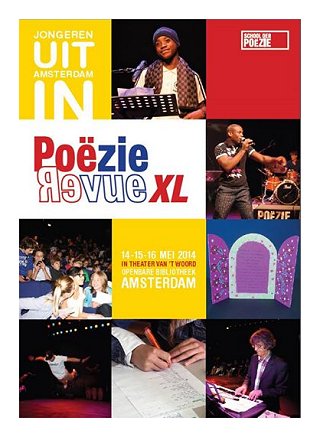 PoëzieRevue XL barst los in de OBA
PoëzieRevue XL barst los in de OBA
Jongeren uit Amsterdam brengen hun gedicht op de planken
Zeven Amsterdamse middelbare scholen, 54 klassen, 1250 jongeren en evenveel gedichten. Verrassende talenten, emoties en bespiegelingen. Raps, beats, dans, VJ`s en meer. Van 14 tot en met 16 mei vormt het Theater van ’t Woord in de Openbare Bibliotheek Amsterdam (OBA) het decor voor het literaire festival PoëzieRevue XL. Van alle 1250 gedichten is een voorselectie gemaakt. In zes afwisselende literaire shows brengen meer dan 200 jongeren hun gedicht op het podium van Theater van ’t Woord.
PoëzieRevue XL is meer dan alleen gedichten van leerlingen. Zo zijn er optredens van de dichters Mustafa Stitou, Ellen Deckwitz en Tjitse Hofman. De breakdance group Turn it Loose zet de zaal op zijn kop en Joy Wielkens zingt de sterren van de hemel met Vlado Spisiak op gitaar. Rapper en beatboxer André Accord presenteert het programma, met live muziek door pianist Polo de Haas en drumster Truus Engels.
Deskundige jury`s beoordelen de gedichten en bepalen wie er met de prijzen vandoor gaan. Naast Stitou, Deckwitz en Hofman nemen onder meer Hans van Velzen, directeur van de OBA, Edith Andriesse, journalist en tekstschrijver, Theo Bijvoet, voormalig hoofd sector Letteren en Bibliotheken van het ministerie van OCW, Malou van Hintum, journalist en tekstschrijver, Jurrien Loman, productieleider orkest Holland Symfonia en Marco de Goede, voormalig voorzitter raadscommissie Kunst en Cultuur gemeente Amsterdam, plaats in één van de jury’s.
500ste PoëzieRevue! Een feestelijk moment in PoëzieRevue XL! Op donderdag 15 mei is er voor de 500ste keer een PoëzieRevue! De allereerste revue ooit was op 4 februari 1994 in De Rode Hoed in Amsterdam. Dichter Huub Oosterhuis richtte de School der Poëzie op. In de afgelopen 20 jaar deden meer dan 150.000 kinderen en jongeren mee aan één van haar projecten en dat heeft maar liefst 300.000 nieuwe Nederlandse gedichten opgeleverd!
Programma PoëzieRevue XL
Woensdag 14 mei 11.00 uur
Christelijke Scholengemeenschap Buitenveldert.
Woensdag 14 mei 14.00 uur
Stelle College en Wellantcollege Linnaeus.
Donderdag 15 mei 11.00 uur
Open Schoolgemeenschap Bijlmer en Orion College.
Donderdag 15 mei 14.00 uur
Open Schoolgemeenschap Bijlmer.
Vrijdag 16 mei 11.00 uur
Hervormd Lyceum West.
Vrijdag 16 mei 14.00 uur
Montessori College Oost.
U bent van harte welkom! De toegang is gratis, reserveren noodzakelijk: info@schoolderpoezie.nl of 020-3307817.
# website: www.schoolderpoezie.nl
PoëzieRevue XL is een initiatief van School der Poëzie en wordt financieel mede mogelijk gemaakt door het Nederlands Letterenfonds en de Dienst Maatschappelijke Ontwikkeling van de Gemeente Amsterdam. Met dank aan de Openbare Bibliotheek Amsterdam . School der Poëzie is landelijk toonaangevend op het gebied van cultuur educatieve projecten met poëzie: www.schoolderpoezie.nl
fleursdumal.nl magazine
More in: Art & Literature News, Literary Events
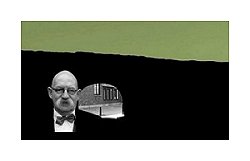
Cookham door Stanley Spencer en
Jezus Christus aan de vergetelheid ontrukt
Gemeen aan Jordaan en Theems is het water. Wat nog?
Natuurlijk de aanwezigheid van Jezus Christus.
Want de verlosser predikte niet enkel in Kafarnaüm,
Gadara en Gennezaret maar deed ook Cookham,
Berkshire, aan. Kijk er Stanley Spencer maar op na.
De schilder bedenkt ons. Met prekend de koning
der joden tijdens regatta’s. Met punters vol mensen
die zich verbazen over dit tegengif voor wantijd.
Op de oevers begerig beschouwen. Hier en daar
toch ongelovigen ook, vrouwen veelal. Koudogige.
Zelfs massale verrijzenis in het dorp laat hen onbewogen,
alsof ze een bioscoop leeg zien lopen. Herkennen ze dan
Matthew Sweeney’s oma niet die jonger en dunner
dan ooit opstaat uit de doden? Zijn ze ervaren in verdwalen?
In mijn geheugen is het gebeier van de kathedraal getatoeëerd.
Drieslagsmaten. Vijfduizendenveertig variaties.
Een man die veertig jaren klokken luidde moest van een arm af.
Bert Bevers
(uit In de buurt van de wereld, Uitgeverij Kleinood & Grootzeer, Bergen op Zoom, 2002)
fleursdumal.nl magazine
More in: Archive A-B, Bevers, Bert
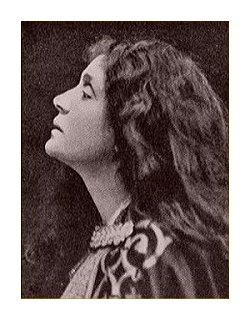
Sara Teasdale
(1884 – 1933)
I Shall Not Care
When I am dead and over me bright April
Shakes out her rain-drenched hair,
Tho’ you should lean above me broken-hearted,
I shall not care.
I shall have peace, as leafy trees are peaceful
When rain bends down the bough,
And I shall be more silent and cold-hearted
Than you are now.
Sara Teasdale poetry
fleursdumal.nl magazine
More in: Archive S-T, Teasdale, Sara
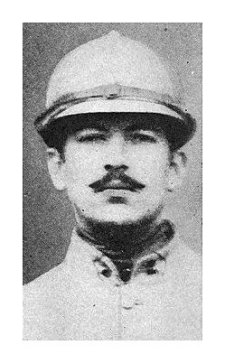
Alan Seeger
(1888-1916)
I Have a Rendezvous with Death . . .
I have a rendezvous with Death
At some disputed barricade,
When Spring comes back with rustling shade
And apple-blossoms fill the air —
I have a rendezvous with Death
When Spring brings back blue days and fair.
It may be he shall take my hand
And lead me into his dark land
And close my eyes and quench my breath —
It may be I shall pass him still.
I have a rendezvous with Death
On some scarred slope of battered hill,
When Spring comes round again this year
And the first meadow-flowers appear.
God knows ’twere better to be deep
Pillowed in silk and scented down,
Where Love throbs out in blissful sleep,
Pulse nigh to pulse, and breath to breath,
Where hushed awakenings are dear . . .
But I’ve a rendezvous with Death
At midnight in some flaming town,
When Spring trips north again this year,
And I to my pledged word am true,
I shall not fail that rendezvous.
Alan Seeger poetry
fleursdumal.nl magazine
More in: Archive S-T, Seeger, Alan
 The Sorrows of Young Werther (34)
by J.W. von Goethe
BOOK II.
OCTOBER 20.
We arrived here yesterday. The ambassador is indisposed, and will not
go out for some days. If he were less peevish and morose, all would
be well. I see but too plainly that Heaven has destined me to severe
trials; but courage! a light heart may bear anything. A light heart!
I smile to find such a word proceeding from my pen. A little more
lightheartedness would render me the happiest being under the sun.
But must I despair of my talents and faculties, whilst others of far
inferior abilities parade before me with the utmost self-satisfaction?
Gracious Providence, to whom I owe all my powers, why didst thou not
withhold some of those blessings I possess, and substitute in their
place a feeling of self-confidence and contentment?
But patience! all will yet be well; for I assure you, my dear friend,
you were right: since I have been obliged to associate continually with
other people, and observe what they do, and how they employ themselves,
I have become far better satisfied with myself. For we are so
constituted by nature, that we are ever prone to compare ourselves with
others; and our happiness or misery depends very much on the objects
and persons around us. On this account, nothing is more dangerous than
solitude: there our imagination, always disposed to rise, taking a new
flight on the wings of fancy, pictures to us a chain of beings of whom
we seem the most inferior. All things appear greater than they really
are, and all seem superior to us. This operation of the mind is quite
natural: we so continually feel our own imperfections, and fancy we
perceive in others the qualities we do not possess, attributing to them
also all that we enjoy ourselves, that by this process we form the idea
of a perfect, happy man,--a man, however, who only exists in our own
imagination.
But when, in spite of weakness and disappointments, we set to work in
earnest, and persevere steadily, we often find, that, though obliged
continually to tack, we make more way than others who have the
assistance of wind and tide; and, in truth, there can be no greater
satisfaction than to keep pace with others or outstrip them in the race.
The Sorrows of Young Werther (34)
by J.W. von Goethe
BOOK II.
OCTOBER 20.
We arrived here yesterday. The ambassador is indisposed, and will not
go out for some days. If he were less peevish and morose, all would
be well. I see but too plainly that Heaven has destined me to severe
trials; but courage! a light heart may bear anything. A light heart!
I smile to find such a word proceeding from my pen. A little more
lightheartedness would render me the happiest being under the sun.
But must I despair of my talents and faculties, whilst others of far
inferior abilities parade before me with the utmost self-satisfaction?
Gracious Providence, to whom I owe all my powers, why didst thou not
withhold some of those blessings I possess, and substitute in their
place a feeling of self-confidence and contentment?
But patience! all will yet be well; for I assure you, my dear friend,
you were right: since I have been obliged to associate continually with
other people, and observe what they do, and how they employ themselves,
I have become far better satisfied with myself. For we are so
constituted by nature, that we are ever prone to compare ourselves with
others; and our happiness or misery depends very much on the objects
and persons around us. On this account, nothing is more dangerous than
solitude: there our imagination, always disposed to rise, taking a new
flight on the wings of fancy, pictures to us a chain of beings of whom
we seem the most inferior. All things appear greater than they really
are, and all seem superior to us. This operation of the mind is quite
natural: we so continually feel our own imperfections, and fancy we
perceive in others the qualities we do not possess, attributing to them
also all that we enjoy ourselves, that by this process we form the idea
of a perfect, happy man,--a man, however, who only exists in our own
imagination.
But when, in spite of weakness and disappointments, we set to work in
earnest, and persevere steadily, we often find, that, though obliged
continually to tack, we make more way than others who have the
assistance of wind and tide; and, in truth, there can be no greater
satisfaction than to keep pace with others or outstrip them in the race.
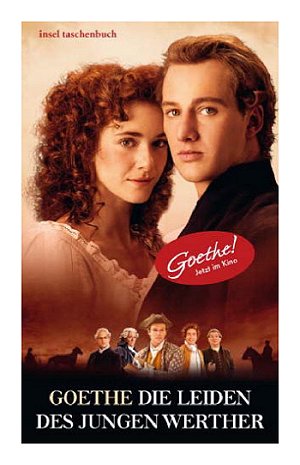 November 26.
I begin to find my situation here more tolerable, considering all
circumstances. I find a great advantage in being much occupied; and the
number of persons I meet, and their different pursuits, create a varied
entertainment for me. I have formed the acquaintance of the Count
C--and I esteem him more and more every day. He is a man of strong
understanding and great discernment; but, though he sees farther than
other people, he is not on that account cold in his manner, but capable
of inspiring and returning the warmest affection. He appeared interested
in me on one occasion, when I had to transact some business with him. He
perceived, at the first word, that we understood each other, and that
he could converse with me in a different tone from what he used with
others. I cannot sufficiently esteem his frank and open kindness to me.
It is the greatest and most genuine of pleasures to observe a great mind
in sympathy with our own.
The Sorrows of Young Werther (Die Leiden des jungen Werther) by J.W. von Goethe. Translated by R.D. Boylan.
To be continued
fleursdumal.nl magazine
November 26.
I begin to find my situation here more tolerable, considering all
circumstances. I find a great advantage in being much occupied; and the
number of persons I meet, and their different pursuits, create a varied
entertainment for me. I have formed the acquaintance of the Count
C--and I esteem him more and more every day. He is a man of strong
understanding and great discernment; but, though he sees farther than
other people, he is not on that account cold in his manner, but capable
of inspiring and returning the warmest affection. He appeared interested
in me on one occasion, when I had to transact some business with him. He
perceived, at the first word, that we understood each other, and that
he could converse with me in a different tone from what he used with
others. I cannot sufficiently esteem his frank and open kindness to me.
It is the greatest and most genuine of pleasures to observe a great mind
in sympathy with our own.
The Sorrows of Young Werther (Die Leiden des jungen Werther) by J.W. von Goethe. Translated by R.D. Boylan.
To be continued
fleursdumal.nl magazineMore in: -Die Leiden des jungen Werther, Goethe, Johann Wolfgang von
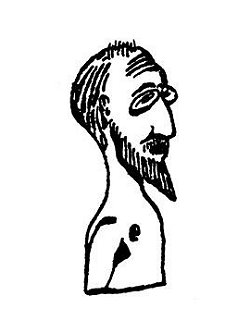
Erik Satie
(1866 – 1925)
Le Tennis
Play ?
Yes !
Le bon serveur.
Comme il a de belles jambes !
Il a un beau nez.
Service coupé.
Game !
21 avril 1914
Erik Satie Le Tennis
fleursdumal.nl magazine
More in: Archive S-T, MUSIC, Satie, Erik
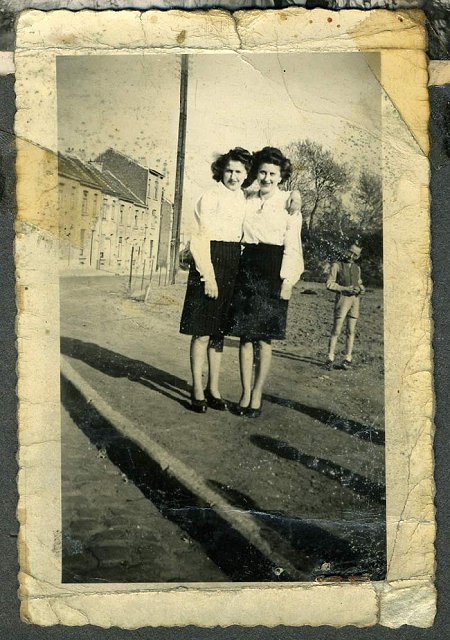
Een tweeling?
Het fotoalbumpje was bijna te vies om aan te pakken. Het lag half uit elkaar, veel kiekjes waren bevestigd met roestige nietjes of er zat smerig plakband overheen. Sommige zaten zelfs op elkaar geplakt. Maar ik kocht het toch maar. Want in de gauwigheid had ik een paar fotootjes gezien die wel ‘wat’ hadden. Zoals dat ene van twee vrouwen dat hierbij geplaatst is.
In het album delen de twee een pagina met andere mensen die ze misschien nooit ontmoet hebben: twee jongemannen van heel lang geleden met mooie petten op en een glas in de hand; een blonde vrouw in nopjesbloes; een lachende jongeheer; een lachende jongen met een rock & roll kuif; en tenslotte een ouder, toeristisch ogend echtpaar, poserend voor een meer dan levensgroot beeld van een roepend hert.
Zouden de vrouwen een tweeling zijn? Of lijkt dat alleen maar door de schijnbaar nagenoeg identieke kledij en haardracht – en door de manier waarop ze naast elkaar staan en elkaar vasthouden? Ook het vergrootglas biedt geen uitkomst. Wel zie je dan dat de rechter vrouw vrolijker lacht. En opeens vallen ook de schaduwen op van drie mensen die kennelijk rechts van de fotograaf staan. Ziet u trouwens hoe ouwelijk dat jongetje rechts op de achtergrond uit zijn ogen kijkt? Zijn korte broek maakt het er ook niet vrolijker op.
Het fotootje zou goed kunnen passen in de Deux Femmes-serie van Danny Braem, een Antwerpenaar die sinds 2008 elke dag een foto van zijn stad maakt en ook andere leuke sites runt. Kijk maar eens naar www.deuxfemmes.be en www.charmantwerpen.be.
Joep Eijkens
fleursdumal.nl magazine
eerder gepubliceerd op www.cubra.nl
More in: - Fotoalbum Joep Eijkens, - Objets Trouvés (Ready-Mades)
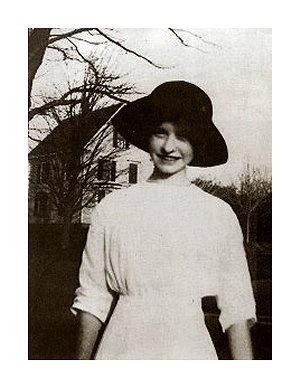
Eunice Tietjens
(1884 – 1944)
The Hand
As you sit so, in the firelight, your hand is the color of
new bronze.
I cannot take my eyes from your hand;
In it, as in a microcosm, the vast and shadowy Orient
is made visible.
Who shall read me your hand?
You are a large man, yet it is small and narrow, like the
hand of a woman and the paw of a chimpanzee.
It is supple and boneless as the hands wrought in pigment
by a fashionable portrait painter. The tapering
fingers bend backward.
Between them burns a scented cigarette. You poise it
with infinite daintiness, like a woman under the
eyes of her lover. The long line of your curved
nail is fastidiousness made flesh.
Very skilful is your hand.
With a tiny brush it can feather lines of ineffable suggestion,
glints of hidden beauty. With a little
tool it can carve strange dreams in ivory and
milky jade.
And cruel is your hand.
With the same cold daintiness and skill it can devise
exquisite tortures, eternities of incredible pain,
that Torquemada never glimpsed.
And voluptuous is your hand, nice in its sense of touch.
Delicately it can caress a quivering skin, softly it can
glide over golden thighs…. Bilitis had not
such long nails.
Who can read me your hand?
In the firelight the smoke curls up fantastically from
the cigarette between your fingers which are the
color of new bronze.
The room is full of strange shadows.
I am afraid of your hand….
(From The Interior)
Eunice Tietjens poetry
fleursdumal.nl magazine
More in: Archive S-T, Tietjens, Eunice
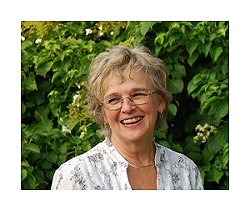
Literaire Salon in’t Wevershuisje 5
Emma Crebolder vertaalt Heilna du Plooy
Reis
Als het dan midwinter was
en ’s nachts het Hogeveld tot poeder
wordt geschroeid in koude en ijl rijp,
dan wilde Pa graag reizen
naar waar het warmer was.
Als wij in het donker nog vertrokken
werden wij in warme dekens toegestopt;
Buiten waren de gekende vormen onbekend
en vreemder nachtblauw bij het verder rijden.
Pa wijst waar de Drie Koningen staat,
Orion, en ook het Zuiderkruis.
Wij kijken steeds maar naar de lucht
verbaasd dat ook de maan kan ondergaan.
Als het lichter wordt,
de zon kogel kleurig rond verschijnt
dan moeten wij om ons heen kijken
en vertellen wat wij zien verdwijnen.
Pa geeft doorlopend les,
aardrijkskunde, plantkunde, dierkunde
en ook geschiedenis komt aan bod:
Kijk, hier begint het landschap te breken-
het binnenland is werkelijk een groot plateau.
Let op, wij rijden nu veel minder omhoog
dan omlaag. Kijk naar de heuvelige
glooiingen daar, de vogels, de soorten gras,
de bomen, hun schors en bladeren:
Als de ochtend gevorderd is, dan
zegt Pa: Voel, het is veel warmer hier.
En dan kijk ik, het Hogeveldse kind,
voorbij de koude en bekende
bleekheid in mijn hoofd
verrukt naar het nieuw gebied:
Langs de weg lange lanen van kersthulst
met grote slappe bloemen schelrood
tegen het groen, en her en der grote
massieve hopen kleur
waar bougainvillias hoog opklimmen
en dan omlaag regenen in roze en paars.
We hebben het land zo leren kennen
en door dat kennen ook lief gekregen.
Met die liefde liggen we nu overhoop:
We zijn met alles wat we zijn:
-dat voel ik in de politieke lucht hangen
een stigma, alleen verleden, vreemd, terloops.
Maar in mijn hoofd zijn de beelden gegrift
zoals in de genen waaruit ik stam:
Nooit hoor ik op een andere plek
zoals op deze, zelfs bij verstek.
Heilna du Plooy
(vertaald van het Zuid-Afrikaans in het Nederlands door Emma Crebolder)
Vertaalvrucht (nr 5): Emma Crebolder vertaalt Heilna du Plooy
Literaire Salon in’t Wevershuisje 5, foto Carina van der Walt
fleursdumal.nl magazine
More in: Archive C-D, Crebolder, Emma, Heilna du Plooy, Literaire Salon in 't Wevershuisje, VERTAALVRUCHT
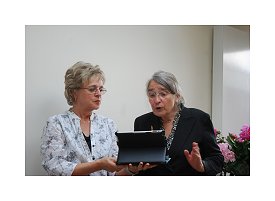
Emma Crebolder (R) & Heilna du Plooy (L)
Literaire Salon in ’t Wevershuisje 4
Heilna du Plooy vertaalt Emma Crebolder
Ons vruchtbaarst verleden
1.
Ons vruchtbaarst verleden lag
in geschriften en bij rivieren, op
keien of stenen aan Schelde of Waal.
De stroming sleepte ons mee.
We moesten de verhalen vinden.
Schorrevaar is achtergebleven. Ze
speelt met uitgeklapte vleugels voor
boek. Ze omvangt de meeuw en
gooit haar trots mijlenver op en wijst,
kijk daar: vriendin van schorrevaar.
2.
Alle lemuren en slingerapen
leren het grijpfijne in
oerbossen. Wij op het asfalt
worden getroffen door
breukzak en wervelzwakte.
Prijsdier Taal, je wordt zo vaak
misvat. Laat ons liever toch
gebaren. Een opgestoken hand
ontwapent hoe graag een mens ook
het brullen na zou willen apen.
Emma Crebolder
Ons vrugbaarste verlede
1.
Ons vrugbaarste verlede is op papier
en langs riviere vasgelê, op die keie
of klippe langs die Schelde of die Waal.
Die stroming het ons meegevoer.
Ons moes na die verhale soek.
Waterraaf het agtergebly. Sy flap
haar vlerke soos ’n boek wyd oop.
Sy omhels die meeu en gooi haar
trots hoog op in die lug en wys,
kyk daar: die vriendin van waterraaf.
2.
Die lemurs en die slingerape
leer almal fyngryp in
die oerbos. Ons hier
op die teer word getref deur
breuke en werwelverweer.
Skoudier Taal, jy word gereeld
verkeerd verstaan. Dan maar liewer
gebare gebruik. ‘n Uitgestrekte hand
ontwapen ook al sou ’n mens
graag ‘n gebrul wou na-aap.
Heilna du Plooy
Vertaling gedicht Emma Crebolder naar het Zuidafrikaans

Vertaalvrucht (nr 4): Emma Crebolder & Heilna du Plooy
Literaire Salon in’t Wevershuisje 4, foto Carina van der Walt
fleursdumal.nl magazine
More in: Archive C-D, Crebolder, Emma, Heilna du Plooy, Literaire Salon in 't Wevershuisje
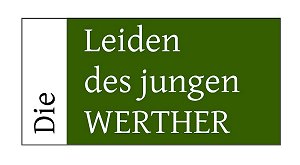 The Sorrows of Young Werther (33) by J.W. von Goethe ♦ SEPTEMBER 10. ♦ Oh, what a night, Wilhelm! I can henceforth bear anything. I shall never see her again. Oh, why cannot I fall on your neck, and, with floods of tears and raptures, give utterance to all the passions which distract my heart! Here I sit gasping for breath, and struggling to compose myself.
The Sorrows of Young Werther (33) by J.W. von Goethe ♦ SEPTEMBER 10. ♦ Oh, what a night, Wilhelm! I can henceforth bear anything. I shall never see her again. Oh, why cannot I fall on your neck, and, with floods of tears and raptures, give utterance to all the passions which distract my heart! Here I sit gasping for breath, and struggling to compose myself.
I wait for day, and at sunrise the horses are to be at the door. And she is sleeping calmly, little suspecting that she has seen me for the last time. I am free. I have had the courage, in an interview of two hours’ duration, not to betray my intention. And O Wilhelm, what a conversation it was!
Albert had promised to come to Charlotte in the garden immediately after supper. I was upon the terrace under the tall chestnut trees, and watched the setting sun. I saw him sink for the last time beneath this delightful valley and silent stream. I had often visited the same spot with Charlotte, and witnessed that glorious sight; and now–I was walking up and down the very avenue which was so dear to me. A secret sympathy had frequently drawn me thither before I knew Charlotte; and we were delighted when, in our early acquaintance, we discovered that we each loved the same spot, which is indeed as romantic as any that ever captivated the fancy of an artist.
From beneath the chestnut trees, there is an extensive view. But I remember that I have mentioned all this in a former letter, and have described the tall mass of beech trees at the end, and how the avenue grows darker and darker as it winds its way among them, till it ends in a gloomy recess, which has all the charm of a mysterious solitude. I still remember the strange feeling of melancholy which came over me the first time I entered that dark retreat, at bright midday. I felt some secret foreboding that it would, one day, be to me the scene of some happiness or misery.
I had spent half an hour struggling between the contending thoughts of going and returning, when I heard them coming up the terrace. I ran to meet them. I trembled as I took her hand, and kissed it. As we reached the top of the terrace, the moon rose from behind the wooded hill. We conversed on many subjects, and, without perceiving it, approached the gloomy recess. Charlotte entered, and sat down. Albert seated himself beside her. I did the same, but my agitation did not suffer me to remain long seated. I got up, and stood before her, then walked backward and forward, and sat down again. I was restless and miserable. Charlotte drew our attention to the beautiful effect of the moonlight, which threw a silver hue over the terrace in front of us, beyond the beech trees.
It was a glorious sight, and was rendered more striking by the darkness which surrounded the spot where we were. We remained for some time silent, when Charlotte observed, “Whenever I walk by moonlight, it brings to my remembrance all my beloved and departed friends, and I am filled with thoughts of death and futurity. We shall live again, Werther!” she continued, with a firm but feeling voice; “but shall we know one another again what do you think? what do you say?”
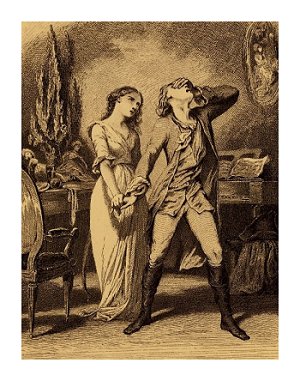 “Charlotte,” I said, as I took her hand in mine, and my eyes filled with tears, “we shall see each other again–here and hereafter we shall meet again.” I could say no more. Why, Wilhelm, should she put this question to me, just at the moment when the fear of our cruel separation filled my heart?
“Charlotte,” I said, as I took her hand in mine, and my eyes filled with tears, “we shall see each other again–here and hereafter we shall meet again.” I could say no more. Why, Wilhelm, should she put this question to me, just at the moment when the fear of our cruel separation filled my heart?
“And oh! do those departed ones know how we are employed here? do they know when we are well and happy? do they know when we recall their memories with the fondest love? In the silent hour of evening the shade of my mother hovers around me; when seated in the midst of my children,
I see them assembled near me, as they used to assemble near her; and then I raise my anxious eyes to heaven, and wish she could look down upon us, and witness how I fulfil the promise I made to her in her last moments, to be a mother to her children. With what emotion do I then exclaim, ‘Pardon, dearest of mothers, pardon me, if I do not adequately supply your place! Alas! I do my utmost. They are clothed and fed; and, still better, they are loved and educated. Could you but see, sweet saint! the peace and harmony that dwells amongst us, you would glorify God with the warmest feelings of gratitude, to whom, in your last hour, you addressed such fervent prayers for our happiness.'” Thus did she express herself; but O Wilhelm! who can do justice to her language? how can cold and passionless words convey the heavenly expressions of the spirit? Albert interrupted her gently. “This affects you too deeply, my dear Charlotte. I know your soul dwells on such recollections with intense delight; but I implore–” “O Albert!” she continued, “I am sure you do not forget the evenings when we three used to sit at the little round table, when papa was absent, and the little ones had retired. You often had a good book with you, but seldom read it; the conversation of that noble being was preferable to everything,–that beautiful, bright, gentle, and yet ever-toiling woman. God alone knows how I have supplicated with tears on my nightly couch, that I might be like her.”
I threw myself at her feet, and, seizing her hand, bedewed it with a thousand tears. “Charlotte!” I exclaimed, “God’s blessing and your mother’s spirit are upon you.” “Oh! that you had known her,” she said, with a warm pressure of the hand. “She was worthy of being known to you.” I thought I should have fainted: never had I received praise so flattering. She continued, “And yet she was doomed to die in the flower of her youth, when her youngest child was scarcely six months old. Her illness was but short, but she was calm and resigned; and it was only for her children, especially the youngest, that she felt unhappy. When her end drew nigh, she bade me bring them to her. I obeyed. The younger ones knew nothing of their approaching loss, while the elder ones were quite overcome with grief. They stood around the bed; and she raised her feeble hands to heaven, and prayed over them; then, kissing them in turn, she dismissed them, and said to me, ‘Be you a mother to them.’
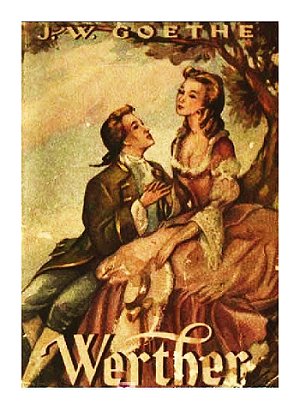 I gave her my hand. ‘You are promising much, my child,’ she said: ‘a mother’s fondness and a mother’s care! I have often witnessed, by your tears of gratitude, that you know what is a mother’s tenderness: show it to your brothers and sisters, and be dutiful and faithful to your father as a wife; you will be his comfort.’ She inquired for him. He had retired to conceal his intolerable anguish,–he was heartbroken, ‘Albert, you were in the room.’ She heard some one moving: she inquired who it was, and desired you to approach. She surveyed us both with a look of composure and satisfaction, expressive of her conviction that we should be happy,–happy with one another.” Albert fell upon her neck, and kissed her, and exclaimed, “We are so, and we shall be so!” Even Albert, generally so tranquil, had quite lost his composure; and I was excited beyond expression.
I gave her my hand. ‘You are promising much, my child,’ she said: ‘a mother’s fondness and a mother’s care! I have often witnessed, by your tears of gratitude, that you know what is a mother’s tenderness: show it to your brothers and sisters, and be dutiful and faithful to your father as a wife; you will be his comfort.’ She inquired for him. He had retired to conceal his intolerable anguish,–he was heartbroken, ‘Albert, you were in the room.’ She heard some one moving: she inquired who it was, and desired you to approach. She surveyed us both with a look of composure and satisfaction, expressive of her conviction that we should be happy,–happy with one another.” Albert fell upon her neck, and kissed her, and exclaimed, “We are so, and we shall be so!” Even Albert, generally so tranquil, had quite lost his composure; and I was excited beyond expression.
“And such a being,” She continued, “was to leave us, Werther! Great God, must we thus part with everything we hold dear in this world? Nobody felt this more acutely than the children: they cried and lamented for a long time afterward, complaining that men had carried away their dear mamma.”
Charlotte rose. It aroused me; but I continued sitting, and held her hand. “Let us go,” she said: “it grows late.” She attempted to withdraw her hand: I held it still. “We shall see each other again,” I exclaimed: “we shall recognise each other under every possible change! I am going,”
I continued, “going willingly; but, should I say for ever, perhaps I may not keep my word. Adieu, Charlotte; adieu, Albert. We shall meet again.” “Yes: tomorrow, I think,” she answered with a smile. Tomorrow! how I felt the word! Ah! she little thought, when she drew her hand away from mine. They walked down the avenue. I stood gazing after them in the moonlight. I threw myself upon the ground, and wept: I then sprang up, and ran out upon the terrace, and saw, under the shade of the linden-trees, her white dress disappearing near the garden-gate. I stretched out my arms, and she vanished.
The Sorrows of Young Werther (Die Leiden des jungen Werther) by J.W. von Goethe. Translated by R.D. Boylan.
To be continued
fleursdumal.nl magazine for art & literature
More in: -Die Leiden des jungen Werther, Goethe, Johann Wolfgang von
Thank you for reading Fleurs du Mal - magazine for art & literature